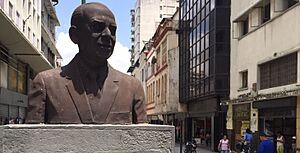Billo Frómeta facts for kids
Quick facts for kids
Billo Frómeta
|
|
|---|---|

Bust of Billo Frómeta in downtown Caracas
|
|
| Born |
Luis María Frómeta Pereyra
November 15, 1915 |
| Died | May 5, 1988 (aged 72) |
Luis María Frómeta Pereyra, better known as Billo Frómeta, was a famous orchestra leader, music arranger, and composer from the Dominican Republic. He was born on November 15, 1915, in Santo Domingo and passed away on May 5, 1988, in Caracas, Venezuela.
Billo's music became very popular around the world. His songs about Caracas, where he lived and had a family, made him a beloved composer. He often included Dominican music styles like Merengue in his recordings. Billo was also a great host for other Dominican musicians visiting Caracas, such as Johnny Ventura and Wilfrido Vargas. Besides merengue, he loved the joropo music style. He was also known for his lively interpretations of Colombian cumbia music.
Contents
Billo's Early Musical Journey
Luis María Frómeta Pereira was born in Pimentel, Duarte Province, Dominican Republic, on November 15, 1915. A few years later, his family moved to San Francisco de Macorís. The school he attended there had mandatory music lessons. This is where he received much of his early music training.
In 1930, when he was just 15 years old, Billo started and led the Banda del Cuerpo de Bomberos de Ciudad Trujillo. This was the fire brigade's band in Ciudad Trujillo (now Santo Domingo). Around this time, he also founded the Orquesta Sinfónica de Santo Domingo, which was a symphony orchestra.
In 1933, he moved back to Santo Domingo. During these years, he met and worked with close friends like Freddy Coronado, Ernesto Chapuseaux, and Simó Damirón. He already knew some of them from school. Together, they formed music groups like the Conjunto Tropical and the Santo Domingo Jazz Band.
Frómeta then began studying Pre-Medicine at the Universidad de Santo Domingo. He had to stop all his musical activities during this time. However, he eventually left his studies in his third year to focus completely on music.
Building a Career in Venezuela
Billo Frómeta arrived in Venezuela in December 1937 with his orchestra. They were invited to play regularly at the Roof Garden, a popular dance club in Caracas. His group, then called the Santo Domingo Jazz Band, performed very well. However, the club owners thought the name wasn't very catchy. They convinced Frómeta to change it to something more appealing.
Frómeta agreed and renamed his group Billo's Caracas Boys. This name change, however, caused problems for him back home. The leader of the Dominican Republic at the time, Rafael Leónidas Trujillo, saw the name change as an insult. Because of this, Billo was not allowed to return to his home country for a long time. Years later, in 1996, a collection of his most famous songs, Billo, Grandes Éxitos, was released.
Frómeta continued to perform in Venezuela until 1958. At that time, the government changed, and he was accused of supporting the previous leader. Because of this, the Asociación Musical del D.F y Estado Miranda (a music association) banned him from playing music in Venezuela.
After the ban, Billo moved to Cuba and played with a Cuban band there. But in 1960, something special happened. The National Assembly of Venezuela held a meeting in Caracas. Their goal was to lift the ban on Billo, which many people now felt was unfair. In that same year, Frómeta was able to return to Venezuela and continue his music career.
Billo's Final Years
On April 27, 1988, Billo Frómeta suffered a stroke. This happened while he was rehearsing with the Venezuela Symphony Orchestra. They were preparing for a special concert to honor him the very next day. Just after he finished conducting a practice run of his song "Un Cubano en Caracas," he collapsed. The orchestra had been applauding his performance. Frómeta passed away the following week, on May 5, 1988.
Images for kids
See also
 In Spanish: Billo Frómeta para niños
In Spanish: Billo Frómeta para niños
- Venezuelan music

